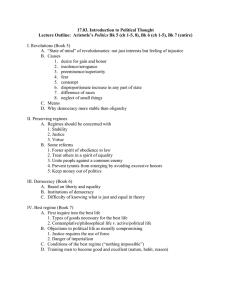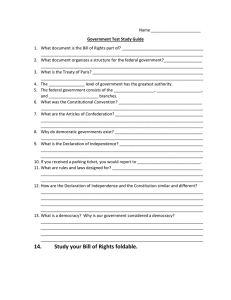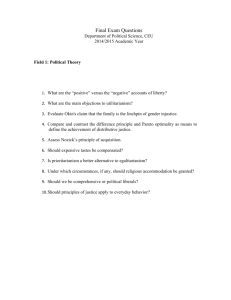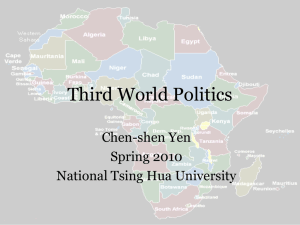Democracy’s Third Wave Samuel Huntington Summary
advertisement
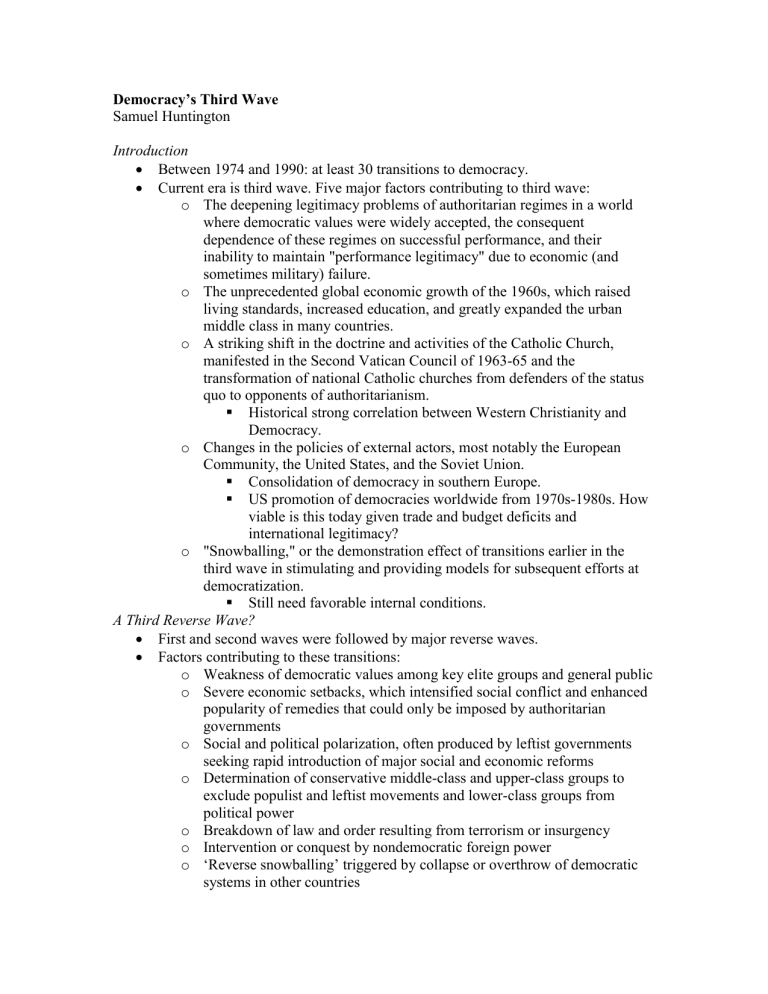
Democracy’s Third Wave Samuel Huntington Introduction Between 1974 and 1990: at least 30 transitions to democracy. Current era is third wave. Five major factors contributing to third wave: o The deepening legitimacy problems of authoritarian regimes in a world where democratic values were widely accepted, the consequent dependence of these regimes on successful performance, and their inability to maintain "performance legitimacy" due to economic (and sometimes military) failure. o The unprecedented global economic growth of the 1960s, which raised living standards, increased education, and greatly expanded the urban middle class in many countries. o A striking shift in the doctrine and activities of the Catholic Church, manifested in the Second Vatican Council of 1963-65 and the transformation of national Catholic churches from defenders of the status quo to opponents of authoritarianism. Historical strong correlation between Western Christianity and Democracy. o Changes in the policies of external actors, most notably the European Community, the United States, and the Soviet Union. Consolidation of democracy in southern Europe. US promotion of democracies worldwide from 1970s-1980s. How viable is this today given trade and budget deficits and international legitimacy? o "Snowballing," or the demonstration effect of transitions earlier in the third wave in stimulating and providing models for subsequent efforts at democratization. Still need favorable internal conditions. A Third Reverse Wave? First and second waves were followed by major reverse waves. Factors contributing to these transitions: o Weakness of democratic values among key elite groups and general public o Severe economic setbacks, which intensified social conflict and enhanced popularity of remedies that could only be imposed by authoritarian governments o Social and political polarization, often produced by leftist governments seeking rapid introduction of major social and economic reforms o Determination of conservative middle-class and upper-class groups to exclude populist and leftist movements and lower-class groups from political power o Breakdown of law and order resulting from terrorism or insurgency o Intervention or conquest by nondemocratic foreign power o ‘Reverse snowballing’ triggered by collapse or overthrow of democratic systems in other countries Potential causes for a new wave: o Systemic failures of democratic regimes to operate effectively could undermine their legitimacy o Reverse snowballing o Security dilemmas o Needs of time – religious fundamentalism, nationalism, oligarchy, etc. Obstacles to Democratization Geo-cultural categories of non-democracies as of 1990: o Home-grown Marxist-Leninist regimes, including the Soviet Union, where major liberalization occurred in the 1980s and democratic movements existed in many republics o Sub-Saharan African countries, which, with a few exceptions, remained personal dictatorships, military regimes, one-party systems, or some combination of these three o Islamic countries stretching from Morocco to Indonesia, which except for Turkey and perhaps Pakistan had nondemocratic regimes; o East Asian countries, from Burma through Southeast Asia to China and North Korea, which included communist systems, military regimes, personal dictatorships, and two semi-democracies (Thailand and Malaysia). Obstacles o Political Absence of experience with democracy Leaders who are not near dying Communist one-party states that were the products of domestic revolution Absence or weakness of commitment to democratic values o Cultural Two theses: Only Western culture provides a suitable base for the development of democratic institutions and, consequently, that democracy is largely inappropriate for non-Western societies Cold War. Certain non-Western cultures are peculiarly hostile to democracy. The two cultures most often cited in this regard are Confucianism and Islam. The real question is which elements in Islam and Confucianism are favorable to democracy, and how and under what circumstances these can supersede the undemocratic aspects of those cultural traditions. Cultural evolution? o Economic Poverty: obstacle to democratic development. Sees economic development as key to democratization. Need political leadership.

